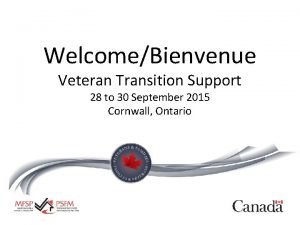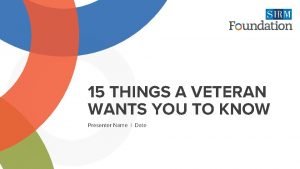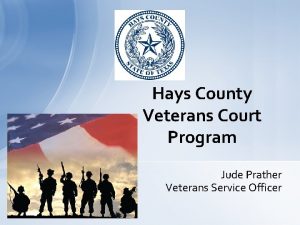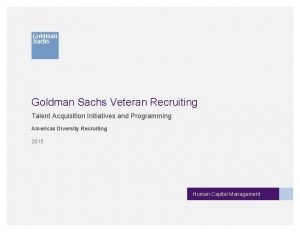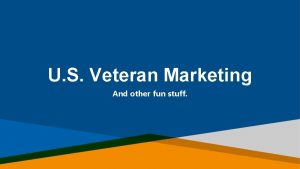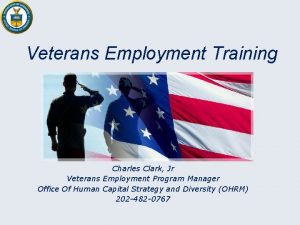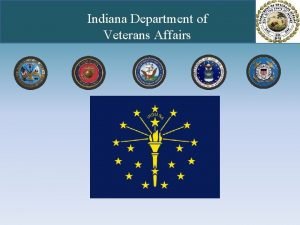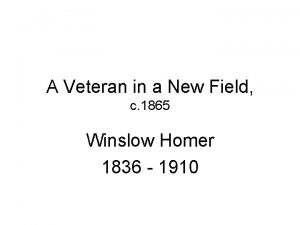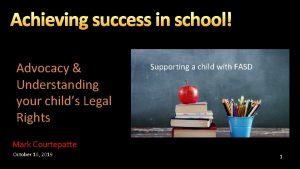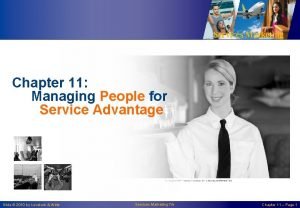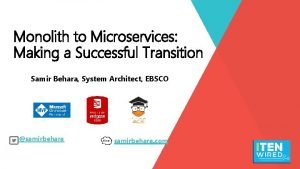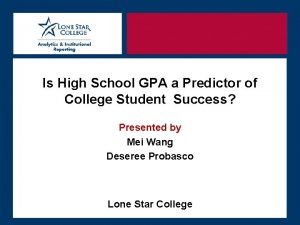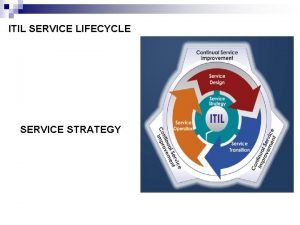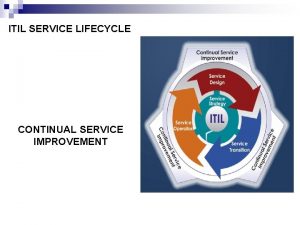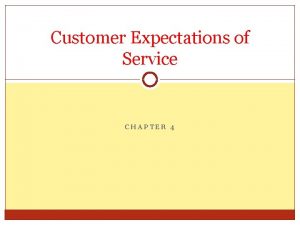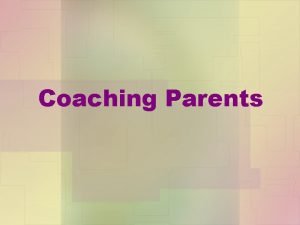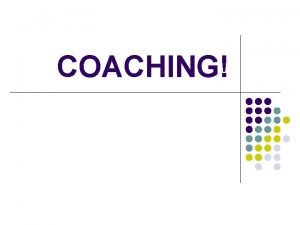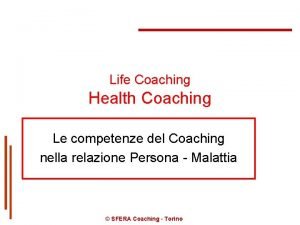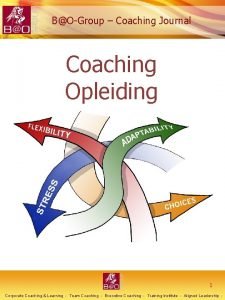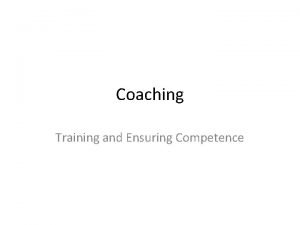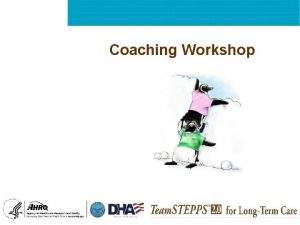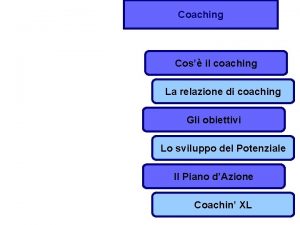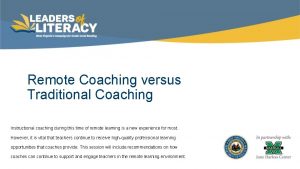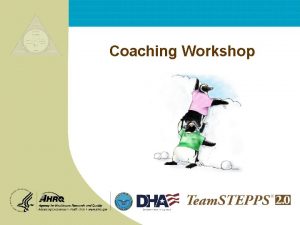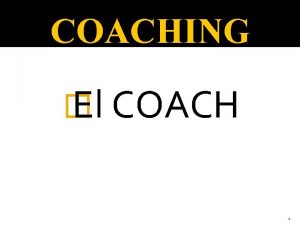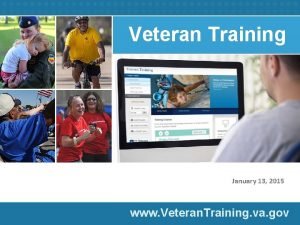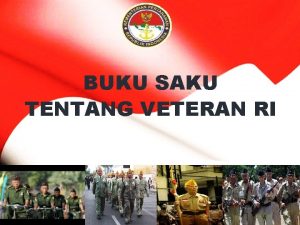Veteran Success Coaching Transition from Service to School
















- Slides: 16

Veteran Success Coaching : Transition from Service to School Alexandria Romanovich Katelyn Glaser Will Kauff

Veteran Students Statistics In 2006, only 25% of veterans, ages 25 and older, held a bachelor’s degree During 2007– 08, approximately 660, 000 veterans and approximately 215, 000 military service members were enrolled in higher education In 2008, there were about 23. 4 million veterans living in the United States As of 2009, only 523, 000 veterans followed through with their VA benefits Unemployment rates for veterans ages 20 -24 are three times higher than the national average

Success Coaching for Veteran Students Mission To help Veteran Students make the sometimes rough transition from active duty to both civilian and student life and to better prepare them for academic and social success at our institution. Success Coaching will cover: Who are Veteran Students Academic Success & Support Social Involvement/Adjustment Mentoring Program Overview Vet Space Program

Characteristics of Veteran Students Typically older students Maturing & Experience gap May be in a different life stage – family, full/part-time job May be part-time/continuing education students Commonly commuter status Adjustment differences – used to group structure, not individual work Cultural barriers Could have technical training such as: medical, translators, infantry training, mechanical/industrial equipment Reasons for attending college may be different

Barriers for Veterans Those coming back from war time efforts face an array of readjustment issues that serve as barriers to returning to normal civilian life. These include: Post Traumatic Stress Disorder (PTSD) Mental and Physical impairments Family reorientation Struggles to ask for help or get assistance Rediscovering societal roles Need for camaraderie/ lack of support system Financing higher education Adjustment to College/Civilian Life Integration Dealing with Stress Academic preparation

Academic Support: From Soldier to Student Veterans are going through a major life transition – from soldier to student Establishing new identity and role Veterans who are new to college life are most likely unfamiliar with the academic process or have been away from school for years May need some readjustment to class structure, study habits, and learning strategies

Campus Support: Student Resources Establishing mature relationships with professors/staff Knowing when & where to ask for help Seeking out school resources, support systems to assist with barriers Career Services Disability Services Academic Advising Counseling Center Tutoring Services Financial Aid These resources need to lead to a challenging & supportive environment for students

Involvement/Readjustment Need to feel connected and engaged on campus Clubs/Organizations Getting involved can help break down barriers, connect students with peer groups and give outlets to share their experiences. Recreational activities Can assist with anxiety & stress Professional Development Internships & On-campus professional organizations However, important for veterans to remember that some students may not understand or agree with military lifestyle

Vet Space is a program that allows faculty and staff to identify themselves as a support person for student Veterans, similar to Safe Space for LGBT populations. Vet Space participants must attend a Vet Space training program.

Vet Space What is a Vet Space certified person? This individual is making a choice to support Veteran Students and has become trained on a number of topics including: Military ABC's & 123's, issues student vets might need assistance with, GI Bill information, community resources & mental health support.

Vet Space How can I find a Vet Space participant? Look for the logo at the bottom of this page in an office, on a door, or in an email signature line. A listing of all certified staff members is also posted in the Veteran Lounge and on our website.

Mentor Program Why is Mentoring Important? Mentoring builds relationships Mentoring validates academic ability College resource and support service referrals All and all, mentoring helps veteran students avoid academic problems and helps administrators maintain enrollment of these students.

Mentor Program Goals & History The main goal of this program is to provide student Vet's with a contact person at the University. The idea is that with one initial contact person students will be more apt to build a relationship, be willing to open up and talk about successes and challenges, and develop as a student over the coming years. Also important to this program is the idea of training our students on the importance of building a support network to better prepare them for a crisis or issue that might arise.

Mentor Program Mentoring Requirements Mentors can be students, staff/faculty, & alumni Military service is required All mentors are required to attend a training session prior to their first semester of involvement Mentors must make at least a one academic year commitment to the program Veteran Mentor/Mentee Application

Other Vet Student Programs Veterans Lounge The Vet Only student lounge is located on the second floor of the student union, next door to the Veteran Student Services office. This lounge provides a place to relax, do homework, connect with other vets, and space to use for group meetings. UVA (University Veterans Association) Student Group with elected executive board members who plan events, outings, speakers, and programs for both Veterans and the campus community.

References Promising Practices in Veterans Education, ACE Publication Veteran Success Jam, ACE Event & Publication Notes Military Service Members and Veterans in Higher Education: What the New GI Bill May Mean for Postsecondary Institutions, ACE Publication Combat to College: A Guide to the Transitioning Student Veterans of American: Student Veteran Handbook Student Development in College: Theory, Research and Practice
 Veteran transition academy
Veteran transition academy 15 things every veteran wants you to know
15 things every veteran wants you to know Hays county district clerk
Hays county district clerk Goldman sachs talent acquisition
Goldman sachs talent acquisition Veteran market segmentation
Veteran market segmentation Schedule a hiring authority 5 cfr 213,3102(u)
Schedule a hiring authority 5 cfr 213,3102(u) Indiana veteran license plate
Indiana veteran license plate Weyth
Weyth Itil service lifecycle service transition
Itil service lifecycle service transition Your child's success or lack of success
Your child's success or lack of success Your child's success or lack of success
Your child's success or lack of success Cycle of failure mediocrity and success
Cycle of failure mediocrity and success Micro service transition
Micro service transition High school gpa as predictor of college success
High school gpa as predictor of college success 5 itil lifecycle stages
5 itil lifecycle stages 7 step improvement process
7 step improvement process Adequate service
Adequate service
